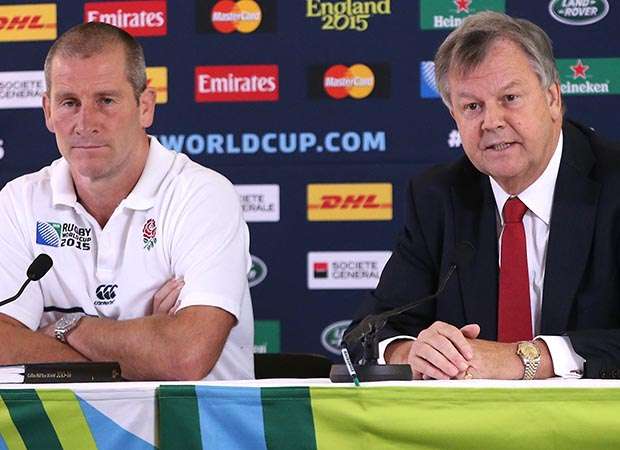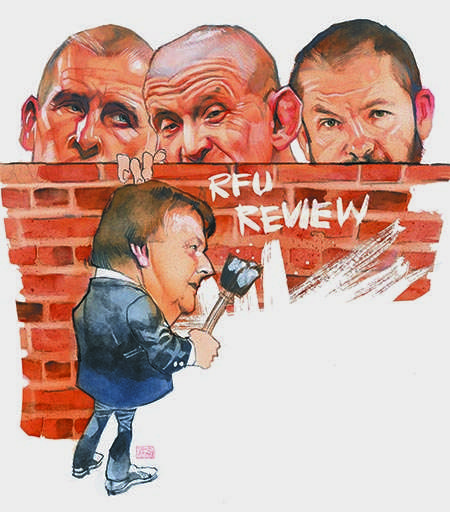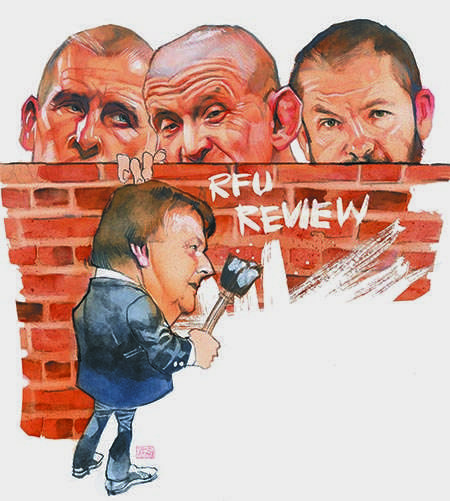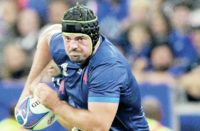 Let the whitewash begin! The RFU review panel eventually announced last Monday – two long weeks after England's ignominious World Cup exit – is a stacked deck. Stacked in the sense that every member of the five-man panel has a potential conflict of interest when it comes to delivering an unbiased assessment. The louder the RFU trumpets its objectivity, the deeper the hole it is digging for English rugby.
Let the whitewash begin! The RFU review panel eventually announced last Monday – two long weeks after England's ignominious World Cup exit – is a stacked deck. Stacked in the sense that every member of the five-man panel has a potential conflict of interest when it comes to delivering an unbiased assessment. The louder the RFU trumpets its objectivity, the deeper the hole it is digging for English rugby.
The RFU's chief executive, Ian Ritchie, should have excluded himself from the process voluntarily rather than taken on the role of chairman. This is because Ritchie, more than anyone, is conflicted after not only appointing head coach Stuart Lancaster, but prematurely offering him and his assistants, Andy Farrell, Graham Rowntree and Mike Catt, six-year contract extensions a year ago.
It should be remembered that Ritchie said, “there will be no shivers of doubt”, about the extensions even if the coaches failed to deliver a Six Nations title last season. However, having given them that leeway, and, more importantly, awarded Lancaster and his team long-term contracts unparalleled in England coaching history, Ritchie must now feel that the ground is moving under his feet.
The RFU chief executive should also explain why the review process has taken so long to activate. Was it too much to expect that the RFU should have had its World Cup review panel ready and waiting, irrespective of whether England crashed and burned in the pool stages, or won the world title for a second time?
The latter option, touted for so long as a realistic prospect by Lancaster's cheerleaders, has been revealed over the last five weeks as a hopeless fantasy.
The biggest problem is that Ritchie is not the only member of the panel who has an obvious conflict of interest.
Having covered two Lions tours in 1989 and 1993, when Ian McGeechan was head coach and yet refused to select for the Test sides Scottish players with whom he had strong bonds as their national coach, it's fair to say that his track record for integrity is strong.
However, the difference between now and those Lions tours, is that McGeechan has already declared an interest were Lancaster's continued selection is concerned.
To begin with, he was on the four-man panel in 2012 that recommended Lancaster be appointed as England head coach. More than that he endorsed Lancaster strongly not only in the forward to the recent book, The House Of Lancaster, but also in his newspaper column.
After England lost to Australia, McGeechan wrote: “England have a strong coaching team in Stuart Lancaster, Andy Farrell and Graham Rowntree. I cannot see anything better out there which is readily available. I would urge Ian Ritchie not to make any rash decisions.” In the forward to the book he says: “Stuart has got England in good shape and has a team playing for all the right reasons.”
 In terms of a declaration of support it is crystal clear, and Ritchie can therefore have been in no doubt about McGeechan's thinking before he was reappointed to this review process. That in itself totally undermines the impartiality of the panel.
In terms of a declaration of support it is crystal clear, and Ritchie can therefore have been in no doubt about McGeechan's thinking before he was reappointed to this review process. That in itself totally undermines the impartiality of the panel.
Of the other panel members, Ian Metcalfe is on the RFU board, and led the executive search that led to Ritchie's appointment. Metcalfe has also been the Professional Game Board (PGB) chairman since 2012, but has kept a low profile in that period and has declined the request by this paper to explain the workings of the PGB on more than one occasion.
For the record, Metcalfe also played in the same Cambridge University era as Rob Andrew, the RFU's Professional Rugby Operations director. Andrew, who was instrumental in assembling the 2012 panel that promoted Lancaster, and sat on it, has not been included in the latest review.
Reports this week that Kevin Bowring, the head of the RFU's coaching development, is interviewing those members of the England squad who have agreed to talk to the review panel is another appointment that beggars belief.
Bowring has been Lancaster's mentor and line-manager at the RFU, and has been a strong influence in his rapid promotion through the coaching ranks. He has said of his relationship with the head coach that he is one of, “Stuart's thinking partners…the people who he thinks out loud with”. They don't come much closer than that.
Ian Whatmore is another Cambridge graduate and a senior civil servant who was chief executive of the Football Association in 2009-2010 before joining the England 2015 Rugby board in 2012. Ritchie also has a football connection having been a director of the Football League, and was their representative on the FA Council at the same time that Whatmore was in office.
Last, there is TV commentator Ben Kay. The 2003 World Cup winner and former Leicester lock has only one potential conflict to deal with. Namely, that he played alongside Rowntree for Leicester and England, with the two sharing the same Tigers changing room for eight years.
There are rumblings of deep discontent within the RFU Council at the compromised nature of a review panel which is a matrix of conflicted interests, and in which the chairman, Ritchie, has not allowed for any examination of his own role in England's World Cup collapse.
This, despite a statement he made in September that whatever happened in the World Cup, as RFU chief executive: “I think you're the one that takes responsibility for it.”
The review panel into the World Cup is underway, but its recommendations are likely to have zero credibility. Worse still, it could become the source of serious internal conflict within the RFU at a time when the most urgent job is to attend to the best coaching structure for a failing England team well before the Six Nations.


























